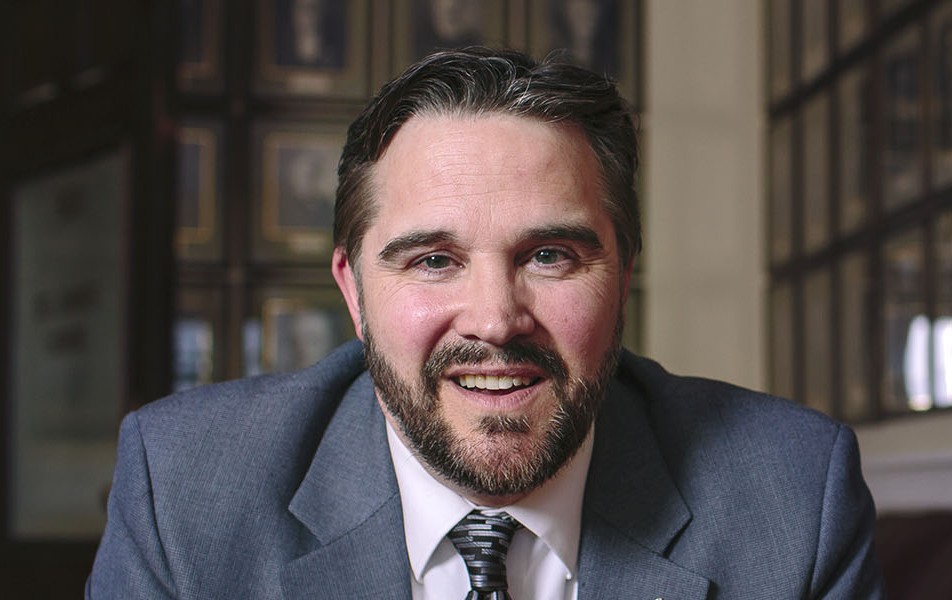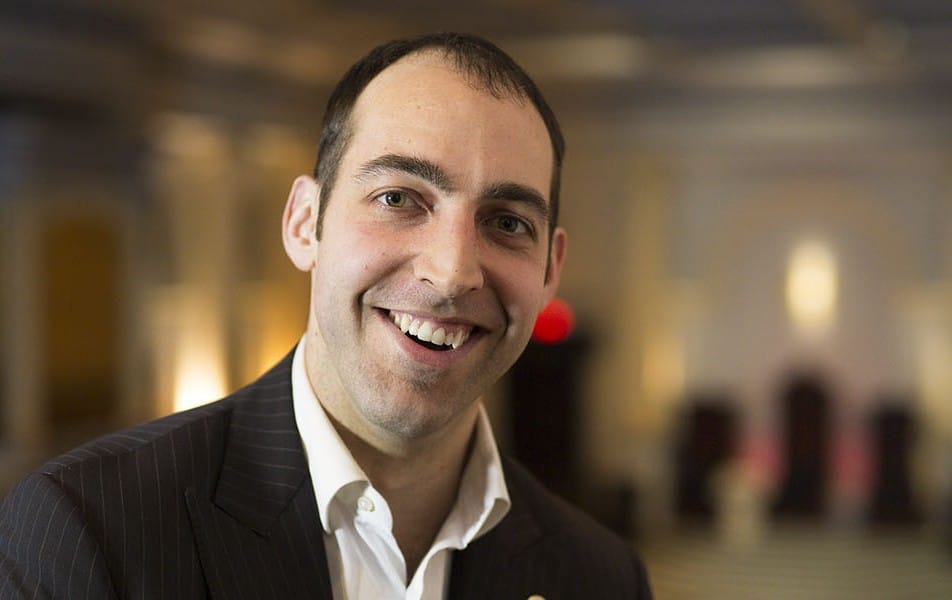Personal Responsibility
This is an address from the 1977 December Quarterly Communication, as delivered by M.W. Stanley F. Maxwell to the brethren assembled that day.
I would like to spend a few minutes with you on the subject of Responsibility.
There is much we can learn from incidents out of the past. As far as the history of mankind is concerned, what took place on a windy winter day in 1827 is not very important. Yet, what happened when a young German by the name of Siegfried Von Arnim arrived in the snowbound city of Weimar has a significance for all of us.
The young man had made the difficult journey from faraway Berlin for one reason; to obtain the autograph of Johann Wolfgang Von Goethe, Europe’s great poet, novelist and philosopher. Autograph collectors of 150 years ago were quite different from ‘autograph hounds’ of today. They were eager to get more than a scrawled signature on a scrap of paper. What they were after was some brilliant forecast or profound advice, a thrilling quote. Dusting his clothes and shining his shoes, young Von Arnim presented himself at Goethe’s home and sent in his calling card. He was welcomed at once, and after a few minutes of general conversation, the great philosopher reached for the autograph album. He closed his eyes, opened them again, sized up his young visitor, and then wrote in a clear firm hand these words: ‘Let everyone sweep in front of his own door and the whole world will be clean.’ He signed his name and handed the album back to Von Arnim. The audience was over.
The years went by. One hundred and fifty often difficult, even tragic, years have passed. Wars and revolutions have been fought. Grandiose plans proclaimed. But fear and distrust are still with us. Once in awhile, an obscure scholar would come across Goethe’s homespun bit of philosophy and shake his head sadly. It seems incredible that the man whom Napoleon hailed as the greatest human being of his generation could have been so trite. But that’s just the point. To some people, even the golden rule seems trite. It takes a wise man to recognize that after we have tried every conceivable shortcut, after we have been given all the instant answers, after we have been presented all the profound plans, we come back to basic principles. That is what the philosopher Goethe wanted to convey that cold day in 1827, when he wrote the simple words: ‘Let everyone sweep in front of his own door and the whole world will be clean.’
As Masons, we know he was right. The most important issue of all is personal responsibility. Things have not changed very much in 150 years. We are still trying everything other than basic principles.
It is much more exciting and much more thrilling to talk about rights; for example, ‘demanding your rights’ is popular today. For some reason, far too many people seem to think that life will be better if in some magical way they are given what they call ‘their rights.’ They are waiting for someone, maybe the government, to ‘sleep’ for them. It is time to make it very clear that human happiness, as well as the very welfare of our nation, depends on accepting personal responsibility. We have tried everything else and now it is time for us to try the ‘tried and true’.
You and I know how easy it is to make demands on others. But the truth of life is that improvement and progress come only when individuals make more and more demands on themselves.

That is what it means to be responsible. As Masons, we have an obligation to keep alive the enduring value of responsibility. Even though many people choose to push other people around rather than push themselves forward, the responsible person believes in achievement.
It is distressing to realize that pride in accomplishment is seen as almost a negative idea today. Reaching for the heights is looked down upon. Anyone who excels, anyone who tries to do his best, anyone who stands out, is viewed as a bit strange.
Our young people have a phrase which describes the situation. You have heard them say, ‘Get lost’. That is exactly what too many Americans seem to be doing. They work at getting lost in the crowd. They refuse to do anything that will cause attention to be drawn to them. For the most part, they simply do not want to do anything at all. Ask someone to work on a committee and see what happens. The excuses pour out, one after another. Why is it that we are so afraid to accept responsibility, even for things that will benefit our community and our country? We would rather remain faceless. Evidently, being mediocre is of greater value than aiming for the stars. If that is true, then we are setting a standard that will bring us only tragedy.
The newspaper columnist, Sydney J. Harris, said it very well: ‘A loser believes in Fate; a winner believes that we make our fate by what we do or fail to do.’ That is what we believe as Masons. We have the basic responsibility to keep alive the idea that each of us has the inner capability of achieving greatness. It may sound trite to say that the fate of the world depends on each man sweeping his own doorstep, but it happens to be true. Achievement and, then, accountability. This is another very unpopular idea. As one comedian says, ‘The devil made me do it’. Too many are willing and ready to blame everything and everyone for why they are the way they are. Children blame their parents. Parents blame the schools. Employees blame the boss. And everybody blames the government.
The responsible person is accountable for his actions. He recognizes that there should be a relationship between productivity and pay. Putting in time on the job is not the same as being a productive worker. Sitting in a classroom is not the same as being a student. Wearing a Masonic emblem is not what makes a man a Mason. No-fault automobile insurance is a good example of what happens when we’re not held accountable for our actions. Insurance claims skyrocket, and so do insurance rates.
After we have tried just about everything else, we come to the realization that society can only operate effectively if people are held accountable for what they do. Actions still speak louder than anything else. Responsibility means achieving the best that is in us. It means being accountable for what we do and how we act. And, finally, responsibility involves a sense of urgency. Historian Arnold Toynbee once wrote, ‘A life which does not go into action is a failure.’ If this is true, then there are a growing number of failures in our world.
Speaking to a national sales executives meeting some years ago, Charles Brower, an advertising executive, said, ‘This is the great era of the goof-off, the age of the half-done job’, Too many of us opt for the easy rather than the difficult; too many are satisfied with just ‘getting by.’
There was a time when people took pride in being on time. That may not seem very important, but today time seems to mean very little. Few ever apologize for being late and a growing number of people do not even bother to call if they are unable to keep an appointment.
Such attitudes are not good enough! Thank goodness Daniel Webster thought differently. In his famed Bunker Hill address, he set the record straight: ‘Let our age be an age of improvement. In a day of peace, let us advance the arts of peace; let us develop the resources of our land; call forth its powers; build up its institutions; and see whether we also may not perform something worthy to be remembered.’
Daniel Webster felt a burning sense of urgency. And so did Winston Churchill. During the Battle of Britain, the headmaster of the school Churchill had attended as a youngster asked the great prime minister to address the student body. Churchill obliged and this is what he said: ‘Never give in. Never give in. Never, never, never, never, never give in.’ Then he sat down, that was his speech.
But unlike Winston Churchill, too many sit down before they even begin. Only with an overwhelming sense of urgency will we ever accomplish anything worthy to be remembered.
Achievement, Accountability and Urgency. These three are the marks of responsibility. The man who lives by these basic principles is not worried about his rights. He is too busy building a solid life; he is too busy constructing his community; and he is too busy working for his country. He has discovered a great truth: If I sweep in front of my own door, the whole world is a better place.
Let us, then, rededicate ourselves to the ideals of Masonry, and remember well the efforts of members of this great fraternity who gave more than 13,000 pints of blood for the benefit of others. Let us remember our [guests at the Overlook] who are so well cared for as a result of our contributions of man power, love and financial support. Let us remember all who work so diligently and loyally for the betterment of a living as a Master Mason.
We have a cause in Freemasonry. Let us all continue to work for the brotherhood of mankind, even in our day.
—







